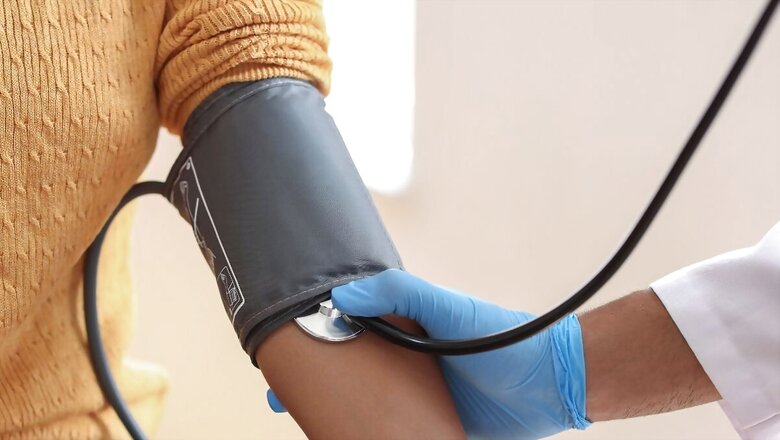
views
A triple single-pill combination for hypertension has shown improved blood pressure control, a new study shows, giving hopes to Indian experts about its potential for use in diabetes and heart diseases apart from blood pressure management.
The combination (SPC) called GMRx2 contains three anti-hypertension drugs — telmisartan, amlodipine, and indapamide.
According to the study published in the medical journal The Lancet in its latest edition, “a novel low-dose Single-pill combinations (SPC) product of telmisartan, amlodipine, and indapamide provided clinically meaningful improvements in blood pressure reduction compared with dual combinations and was well tolerated”.
The study, which was a randomised, double-blind, active-controlled and international clinical trial, says this “SPC provides a new therapeutic option for the management of hypertension and its use could result in a substantial improvement in blood pressure control in clinical practice”.
The study holds relevance for Indians because as per estimates by the World Health Organisation (WHO), of the estimated 22 crore people in India living with hypertension, only 12 per cent have their blood pressure under control. It says that hypertension kills more adults than any other cause in the country.
What does the study say?
The study, published on October 19, compared three possible two-drug combinations with a low-dose cocktail of three antihypertensive medications.
The trial was conducted between July 9, 2021, and September 1, 2023. Authors randomly allocated 1,385 participants to four groups — 551 to GMRx2, 276 to telmisartan–indapamide, 282 to telmisartan–amlodipine, and 276 to amlodipine–indapamide groups.
The mean age of participants was 59 years of which 712 (51 per cent) were female and 673 (48.6 per cent) were male. The mean clinic blood pressure at the screening visit was 142/85 mm hg when taking an average of 1.6 blood pressure medications.
Following the run-in on GMRx2 half dose, the mean clinic blood pressure level at randomisation was 133/81 mm Hg and the mean home blood pressure level was 129/78 mm Hg.
The study showed that the triple drug combination was more effective than the three combinations of two antihypertensive agents. The adverse effect profile was similar (not higher) with a triple-drug combination. The treatment was withdrawn due to adverse events in 11 participants in the GMRx2 group, four in telmisartan–indapamide, three in telmisartan–amlodipine, and four in amlodipine–indapamide.
Good evidence but needs more research
While Indian experts don’t fully agree that the single-pill combination is a “novel” drug for India and cocktail drugs are a good idea, they believe that one of the biggest benefits of this kind of medicine would be to ensure compliance.
Experts explained that using several drugs simultaneously as a first-line treatment — each working through different biological pathways or mechanisms — is a new and innovative approach. This strategy aims to enhance treatment effectiveness, potentially overcoming challenges.
Dr Anoop Misra, chairman of Fortis C-Doc Hospital for Diabetes and Allied Sciences, explained that the “frontline dosing of multiple drugs targeting different mechanisms is a novel concept, applicable to not only hypertension but also diabetes and heart failure”.
Misra believes that “the drug is easy to take, particularly in India where compliance to and availability of multiple drugs are major issues”.
Similarly, Dr Sudhir Kumar, a neurologist at Apollo Hospitals, Hyderabad, stressed the importance of maintaining compliance. “One of the reasons for poor BP control among patients with hypertension is poor compliance with the treatment. This could be because of the higher pill burden (as they need to take many pills) and higher dosing frequency (need to take medications twice a day).”
“With the triple drug combination, both these issues could be overcome — three drugs in a combination means there is a need to take a single pill, and longer duration of action means there is a need to take a single tablet every 24 hours.”
Kumar added that this triple drug combination could indirectly result in a significant reduction in the risk of stroke and heart attack. However, he said there is a need to do more studies, with a larger number of participants and for a longer duration before this combination can be routinely prescribed in clinical practice.
Dr S Ramakrishnan, professor of cardiology at All India Institute of Medical Sciences (AIIMS), New Delhi, told News18 that such combinations are widely available and used in India. “Indian pharma (companies) launched these drugs long back with limited studies. This evidence is a good addition.”
Ramakrishnan highlighted that India’s BP control rates are abysmal and there is an urgent need to take this seriously.
Another expert, Dr Rajeev Jayadevan, convener, the scientific committee and past president, India Medical Association (IMA), Cochin highlighted potential problems with using cocktail drugs or multiple combination medicines.
“Each of these three medicines could have their own side-effects, which can compound in a given patient and can be difficult to sort out for the treating doctor,” he said, explaining that it will not be clear as to which medicine is responsible for which side-effect or allergy when taken all at once.
However, advocates of such combination pills argue that by using several drugs at relatively smaller doses, the chance of side effects is not greater.
“Giving a fixed dose three-drug combination pill appears to work in this randomised trial when compared to two-drug combination regimens. There may be a place for this preparation among hypertensives that are difficult to control,” Jayadevan said while adding a line of caution.
Although the three agents have three different mechanisms of reducing blood pressure, the combined actions of these drugs could potentially cause kidney problems, he said, especially in dehydrated people. “It could also affect their potassium levels in various ways. The trial however does not report such problems.”




















Comments
0 comment